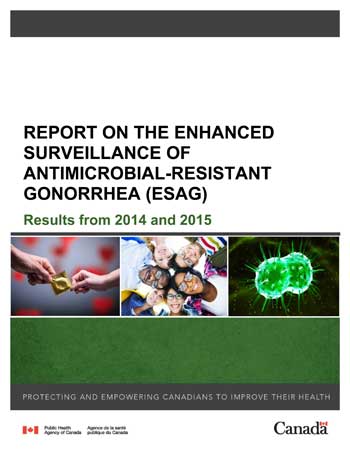

So it was "extremely important that suboptimal treatment does not occur," the letter said.
Super strain gonorrhea 2014 full#
The more patients who don't complete full course of treatment, the more resistant gonorrhea bacteria survive. In her letter to Britain's medical professionals, Davies called for everyone to follow proper protocol for the treatment of gonorrhea. Doctors are also wrongly prescribing ciprofloxacin - a drug to which gonorrhea bacteria are widely resistant, and which hasn't been recommended in years, according to the Washington Post. In the "super-gonorrhea" outbreak in Leeds, patients were exhibiting a resistance to azithromycin, the BBC reported. But a BBC investigation in March found that a number of healthcare consultation websites were only offering azithromycin - not ceftriaxone, too. If treated correctly, the STI can clear up in a couple of weeks.
Super strain gonorrhea 2014 plus#
As of 2012, the CDC recommends ceftriaxone, plus either azithromycin or doxycycline, as "the only first-line treatment" for gonorrhea. Gonorrhea tends to be treated in two steps: an injectable drug called ceftriaxone, and an oral drug - either azithromycin or doxycycline. The weaker bacteria are killed, but the resistant bacteria survive. One occurs when a patient takes a too-mild dose of medication or doesn't complete a full course of antibiotics.

How is gonorrhea treated, and why is it becoming resistant to those drugs? There are a number of ways bacteria can become resistant to drugs. Sometimes, it can even spread to the blood or joints, which can be fatal. It can also prevent males from being able to father children. If left untreated, gonorrhea can cause pelvic inflammatory disease in females, the CDC warns - the complications of which include infertility. For females, symptoms include vaginal discharge and bleeding between periods. For males who do, symptoms include white, yellow or green urethral discharge and testicular pain. Many people with gonorrhea experience no symptoms. You can contract gonorrhea through skin-to-skin sexual contact with an infected person's penis, vagina, mouth or anus, the CDC says, noting that ejaculation doesn't have to occur for the STI to be transmitted. But that's likely less than half the number of infections that take place given the huge number of cases that go undetected and unreported, the CDC estimates that 820,000 new gonorrheal infections occur in the U.S. Here in the United States, 350,062 cases of gonorrhea were reported to the CDC in 2014. In female-bodied people, that also includes the cervix, uterus and fallopian tubes. Infection can occur in the urethra and in body parts with mucus membranes, such as the mouth, throat, eyes and rectum. It's capable of occurring in both males and females, according to the Centers for Disease Control and Prevention. The US agency has also warned that this could "facilitate transmission of human immunodeficiency virus (HIV)." Not only this, it can also cause eye infections.So what is gonorrhea, anyway? Gonorrhea is a sexually transmitted infection caused by the Neisseria gonorrhoeae bacterium. The Centers for Disease Control and Prevention (CDC) said cases of gonorrhea, which is caused by the bacteria Neisseria gonorrhoeae, have increased 63 percent since 2014. Instead, they’re self-medicating, a WHO spokesperson told The Sun, adding that the “super gonorrhea” is extremely resistant to antibiotics. The Agency also explained that the new strain is exploding is because most people aren’t going to the hospital unless they come down with COVID-19 symptoms. The new strain does not respond to the normal first-line treatments, making it even more dangerous and uncomfortable for those infected, according to the report.ĭoctors and medical experts have long warned of the possibility that “superbugs” that are antibiotic-resistant could become more commonplace, and this is one example of such a thing happening.

"Such a situation can fuel the emergence of resistance in gonorrhea including gonorrhea superbug (super gonorrhea) or gonorrhea with high-level resistance to current antibiotics recommended to treat it," a WHO spokesperson told British media outlet The Sun. Azithromycin has seen an increase in usage during the pandemic. The agency also states the sexually transmitted infection (STI) may become even more resistant to the recommended treatments like azithromycin, which typically is used for chest and sinus infections. The agency says the disease is spreading due to actual antibiotic overuse for those infected with the novel coronavirus. The World Health Organization (WHO) has confirmed that a “super gonorrhea” is spreading fast due to the COVID-19 pandemic.


 0 kommentar(er)
0 kommentar(er)
